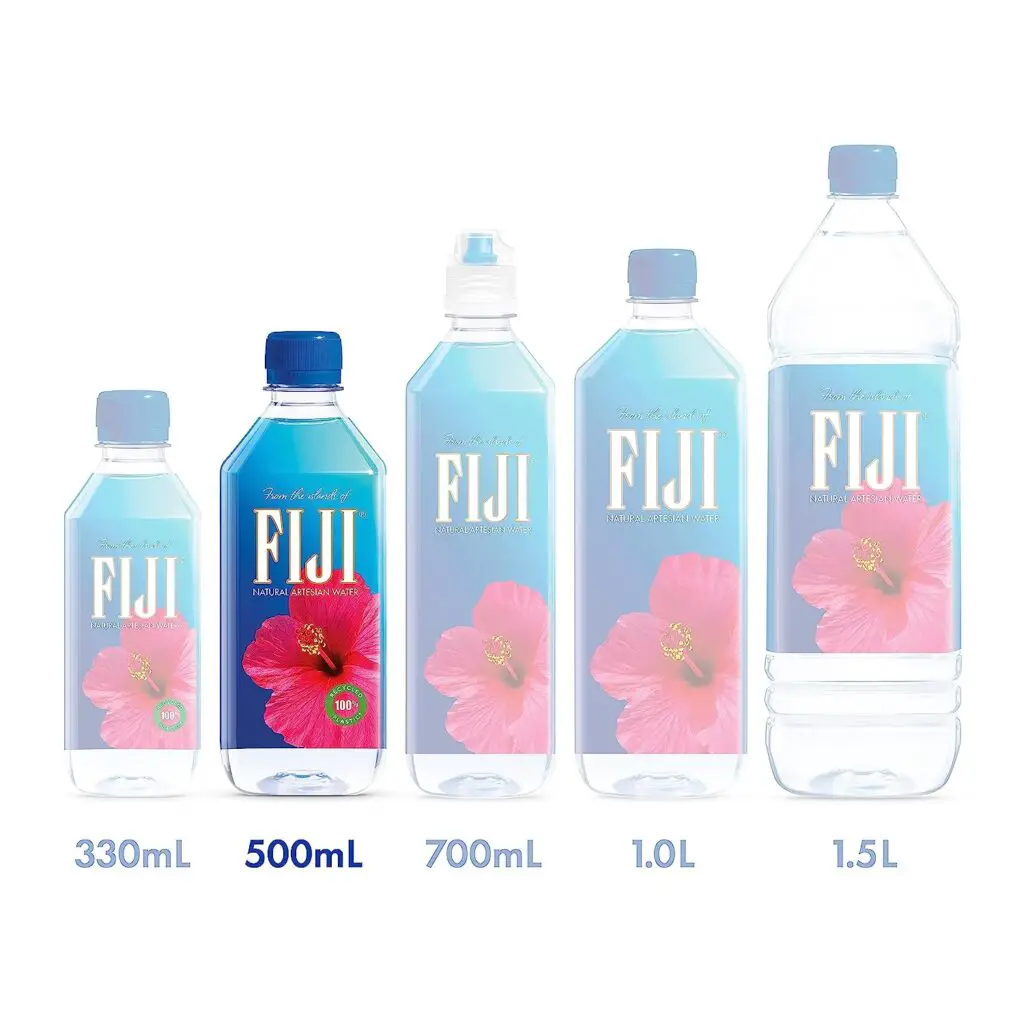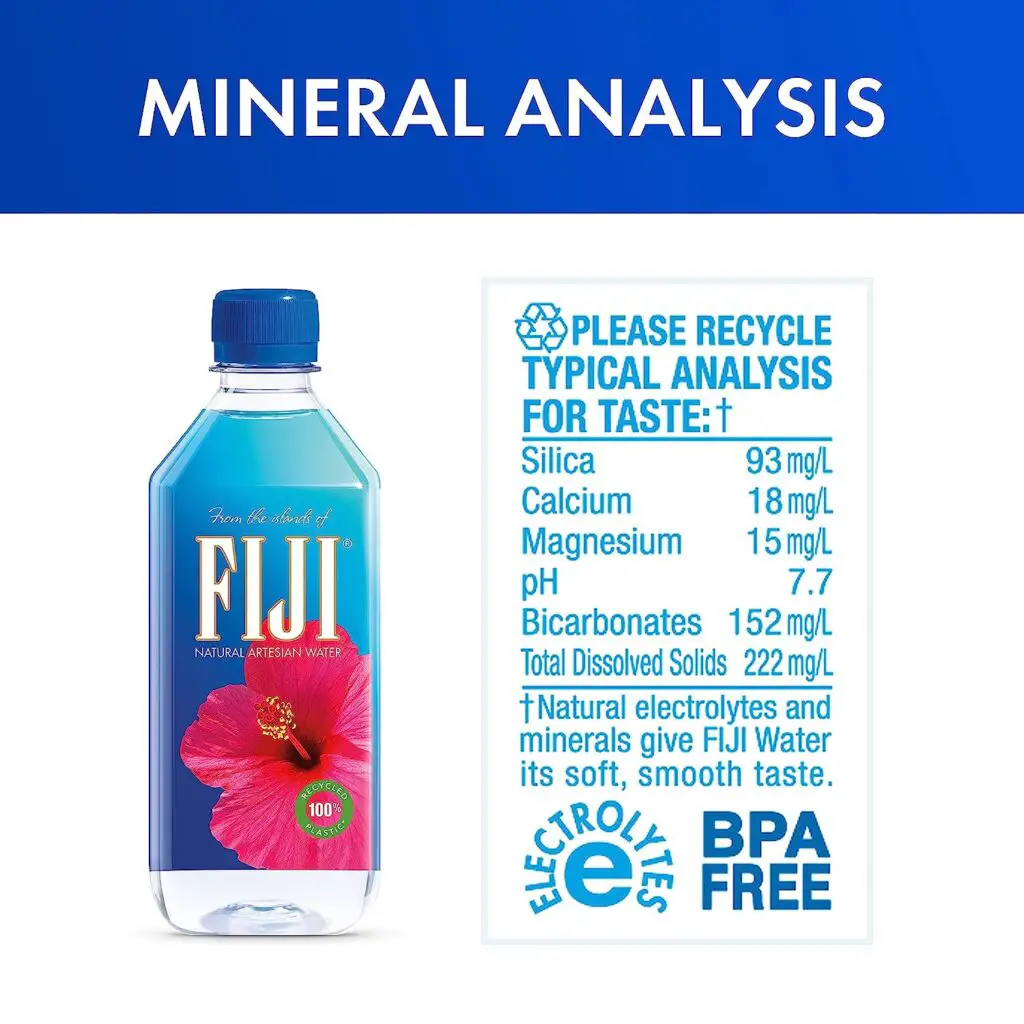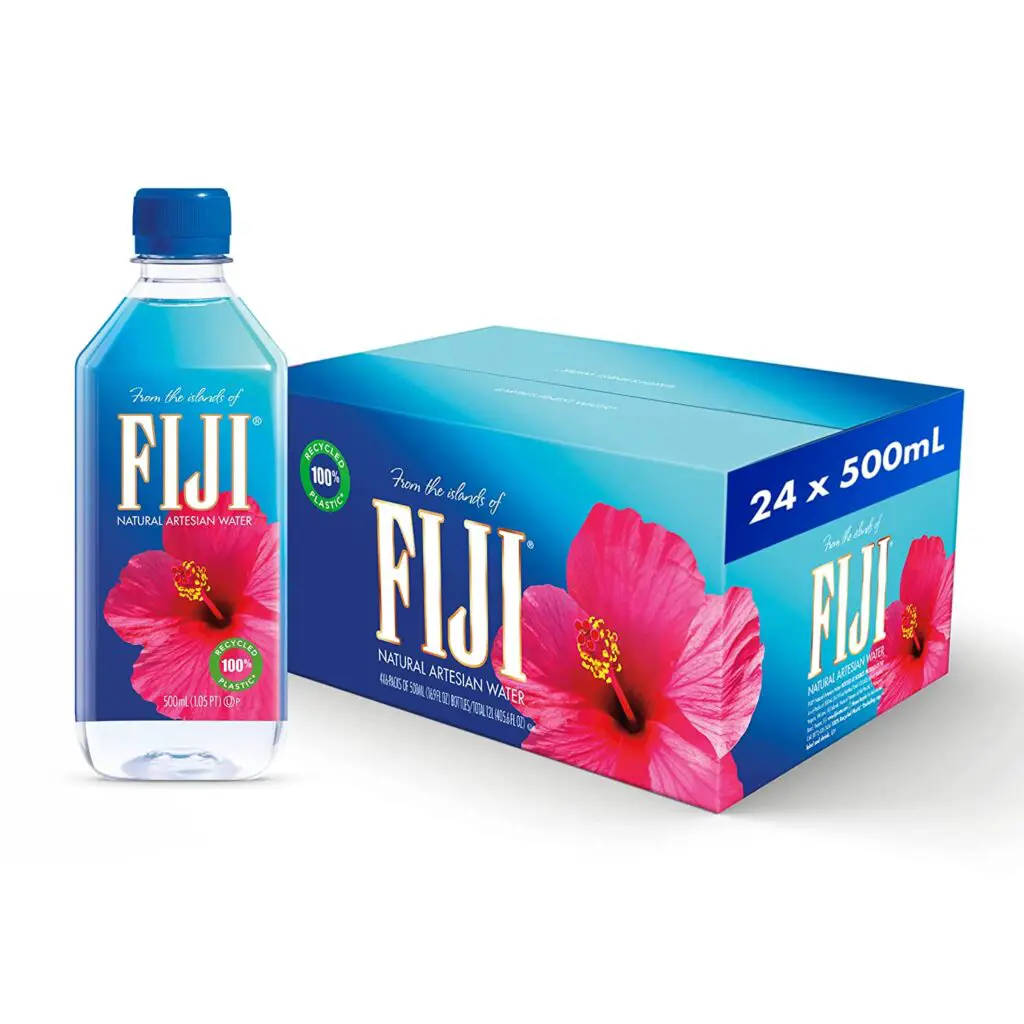Bottled water has become a popular choice for many people to stay hydrated. One brand that has gained attention is Fiji Water. But the question remains, is Fiji Water good for you? This article will look closely at Fiji Water and evaluate its potential health benefits and drawbacks.
Overview Of Fiji Water

Fiji Water is a bottled water brand that is sourced, derived, and shipped from the remote islands of Fiji. The water is said to come from an underground aquifer in the Yaqara Valley, which is known for its pristine quality. Fiji Water is filtered naturally through volcanic rock, further enhancing its purity and taste.
Importance Of Evaluating The Health Benefits Of Bottled Water
With the increasing popularity of bottled water, it is essential to consider the health benefits of the water we consume. While water is necessary for maintaining bodily functions and promoting overall health, not all bottled water brands are created equal. By evaluating the health benefits of Fiji Water, we can make informed choices about our hydration preferences and overall well-being.
By examining Fiji Water’s purity, mineral content, and pH level, we can assess its potential benefits and drawbacks and determine whether it suits our hydration needs. For more information on the topic, you can refer to Fiji Water on Wikipedia.
What Is Fiji Water?
Fiji Water is a popular brand of bottled water that hails from the remote island nation of Fiji, located in the South Pacific Ocean. It is known for its distinctive taste, which is achieved by filtering rain and groundwater through layers of volcanic rock. The water is then sourced from the Yaqara Valley on the island of Viti Levu and distributed worldwide.
Source And Filtration Process Of Fiji Water
The source of Fiji Water is an underground aquifer in the Yaqara Valley. Rainfall trickles down through the volcanic rock, which acts as a natural filtration system, ensuring that the water remains untouched and pure. The aquifer is located deep within the earth and is protected from environmental pollutants, resulting in a pristine water source. The water is then carefully collected and bottled without any contaminants, preserving its quality.
The water undergoes a series of filtration processes to ensure the highest purity and safety standards. This includes filtering through layers of volcanic rock and clay, which further removes impurities and enhances the taste of the water. The natural filtration process of Fiji Water gives it a unique flavor that sets it apart from other bottled water brands.
Unique Mineral Composition Of Fiji Water
One of the distinguishing features of Fiji Water is its mineral composition. The water is naturally rich in minerals like silica, calcium, and magnesium, which are essential for maintaining a healthy body. These minerals contribute to the unique taste of Fiji Water and can provide health benefits such as promoting healthy bones and cardiovascular function.
Fiji Water is known for its unique source, meticulous filtration process, and distinctive mineral composition. Whether you’re looking for a refreshing drink or considering the health benefits of bottled water, Fiji Water is a popular choice among consumers.
Health Benefits Of Fiji Water
Fiji Water is not only known for its exceptional taste and purity but also for the health benefits it offers. Here are some of the essential minerals present in Fiji Water and how they contribute to maintaining good health:
Essential Minerals Present In Fiji Water

1. Calcium: Fiji Water contains calcium, a mineral important for maintaining strong bones and teeth, supporting proper nerve function, and muscle contraction.
2. Magnesium: Magnesium is another important mineral found in Fiji Water. It plays a crucial role in various bodily functions, including energy production, muscle function, and blood pressure regulation.
3. Silica: Fiji Water also contains silica, a mineral that is known to support healthy skin, hair, and nails. Silica is believed to help promote collagen production, which can contribute to overall skin health and elasticity.
How These Minerals Contribute To Maintaining Good Health
These essential minerals present in Fiji Water offer several health benefits for individuals:
1. Bone Health: Calcium and magnesium are essential for maintaining strong bones and preventing conditions like osteoporosis. Regular intake of these minerals can help promote bone density and reduce the risk of fractures.
2. Muscle Function: Magnesium plays a crucial role in muscle function and can help prevent muscle cramps and spasms. It also contributes to the production of energy and supports proper muscle relaxation.
3. Healthy Skin and Hair: Silica, found in Fiji Water, promotes healthy skin, hair, and nails. It can help improve skin elasticity, reduce wrinkles, and strengthen hair and nails.
Incorporating Fiji Water into your daily hydration routine can provide you with these essential minerals, contributing to overall health and well-being. However, it’s important to note that while Fiji Water offers these health benefits, maintaining a balanced diet and consulting with a healthcare professional for personalized advice is always recommended.
Environmental Impact Of Fiji Water
Examining its environmental impact is important when considering whether Fiji Water is good for you. While the company claims its water is clean and essential, there are concerns regarding its production, transportation, and packaging. Here are some key points to consider:
Carbon Footprint Of Transporting Bottled Water
Transporting bottled water across great distances contributes to its carbon footprint and raises concerns about sustainability. Fiji Water is sourced from Fiji, a remote Pacific island, and is transported worldwide. This process requires energy and emits carbon dioxide (CO2), contributing to climate change.
According to Fiji Water’s own analysis, for the base year ending in June 2007, its total annual carbon footprint from production and distribution was 85,396 metric tons of CO2eq. While the company has taken steps to reduce its emissions and become carbon negative, it’s important to consider the energy and resources spent on transporting bottled water.
Plastic Waste And Its Impact On The Environment
Fiji Water’s packaging, particularly its plastic bottles, has also raised concerns. Plastic bottles, especially those made from non-biodegradable materials, contribute to pollution and harm marine life. They also pose a risk to human health, as chemicals from plastic, such as bisphenol A (BPA), can leach into the water.
Recycling is crucial to reducing the environmental impact of plastic bottles. Fiji Water acknowledges that recycling can significantly reduce its carbon footprint. However, it’s essential to note that the overall recycling rates for bottled water are relatively low, and initiatives to expand curbside recycling programs and container deposit laws are needed to address this issue.
Considering these environmental concerns, individuals seeking a more sustainable approach to hydration may want to explore alternative options, such as filtered tap water or reusable water bottles. These alternatives offer a more eco-friendly approach to staying hydrated while reducing plastic waste.
For more information on the environmental impact of bottled water and sustainable hydration practices, you can visit here.
Sustainability Efforts Of Fiji Water
As environmental concerns continue to gain prominence, it is important to evaluate the sustainability efforts of companies like Fiji Water. Here are some notable initiatives taken by Fiji Water to reduce its environmental impact:
Renewable energy usage: Fiji Water is committed to minimizing its carbon footprint by utilizing renewable energy sources. The company’s operations are powered by 100% renewable energy, including hydroelectric power sourced from a nearby river. This shift towards renewable energy reduces reliance on non-renewable resources such as fossil fuels and helps mitigate climate change.
Water conservation initiatives: Fiji Water recognizes the importance of responsible water usage and has implemented various water conservation practices. These initiatives aim to reduce overall water consumption during production processes. Additionally, Fiji Water utilizes rainwater collection systems at its bottling plant, decreasing water usage.
Fiji Water aims to address environmental concerns and positively contribute to its communities by implementing these sustainability measures. The company’s commitment to renewable energy and water conservation showcases its dedication to minimizing its environmental impact.
It is important to note that while Fiji Water’s sustainability efforts are commendable, there are still concerns regarding its use of plastic bottles. As a consumer, weighing the pros and cons of bottled water consumption and considering sustainable alternatives such as reusable water bottles or tap water filtration systems is essential.
To learn more about Fiji Water’s sustainability initiatives, visit their official website or refer to reliable sources like Wikipedia.
Ethical Concerns And Indigenous Communities

Criticisms Regarding The Extraction Of Water And Its Impact On Local Communities
While Fiji Water has gained popularity as a premium bottled water brand, it has also faced criticisms regarding its water extraction and its impact on local communities in Fiji. Concerns raised include:
- Environmental Impact: The production and transportation of bottled water, including Fiji Water, contribute to carbon emissions and plastic waste, raising questions about the brand’s sustainability.
- Water Availability: Some critics argue that bottling large quantities of water from Fiji’s artesian aquifers could potentially strain local water sources and negatively impact the availability of clean drinking water for Fijian communities.
- Economic Benefits: There are debates about the distribution of economic benefits from Fiji Water’s operations. Critics argue that the local Fijian people may not be benefiting proportionally from the profits generated by the company.
Response And Actions Taken By Fiji Water To Address These Concerns
Fiji Water has addressed these concerns and improved its sustainability practices. Some actions taken include:
- Carbon Neutrality: Fiji Water has committed to being carbon-negative by offsetting 120% of its greenhouse gas emissions through initiatives such as tree planting and using renewable energy sources.
- Packaging Sustainability: The company aims to reduce plastic waste by using more recycled PET materials in its bottles and striving for a 100% rPET bottle by 2025.
- Community Engagement: Fiji Water has implemented programs to support local communities, including providing jobs and economic benefits to Fijians through its operations.
- Transparency: The company has engaged in dialogue with stakeholders, published information on its carbon footprint, and participated in initiatives like the Carbon Disclosure Project to disclose carbon emissions.
Consumers need to consider these ethical concerns when making choices about bottled water consumption and to
Cost And Accessibility Of Fiji Water
When considering whether Fiji Water is good for you, it’s essential to consider the cost and accessibility factors. Here are some key considerations:
Price Comparison With Other Bottled Water Brands And Tap Water
- Fiji Water Cost: Fiji Water is generally considered a premium brand and is priced higher than some other bottled water brands on the market. The cost of Fiji Water can vary depending on the size of the bottle and the location of purchase. It is typically more expensive compared to brands like Aquafina or Dasani. However, it is worth noting that the cost of Fiji Water is not solely based on the water itself but also encompasses factors such as packaging, marketing, and branding.
- Tap Water Cost: Tap water, on the other hand, is significantly cheaper than bottled water. In many countries, tap water is subject to stringent regulations and quality control measures to ensure its safety for drinking. Choosing tap water can be a cost-effective option and a more sustainable choice, as it reduces plastic waste.
Accessibility Considerations For Consumers
- Global Accessibility: Fiji Water is available in many countries worldwide and has gained popularity for its distinctive taste and origins from a remote and pristine location. It can be found in grocery stores, convenience stores, and online platforms, making it easily accessible for consumers in these areas.
- Local Accessibility: While Fiji Water is widely available in many regions, its accessibility may vary in specific locations. Availability may be influenced by factors such as distribution networks and market demand. Consumers need to evaluate the local availability of Fiji Water in their area.
As with any bottled water, consumers should consider their budget and environmental impact when choosing water options. Exploring alternatives like tap water or locally sourced bottled water can provide sustainable and cost-effective alternatives to Fiji Water. Ultimately, the choice of water consumption depends on individual preferences, convenience, and priorities.
Alternative Options And Considerations
When it comes to staying hydrated, there are alternative options to consider that are both environmentally friendly and cost-effective. Here are some alternative options to bottled water:
Reusable Water Bottles And Tap Water Filtration Systems
Reusable water bottles: Investing in a reusable water bottle is a great way to reduce single-use plastic waste. Numerous options are available, from stainless steel bottles to glass bottles with protective sleeves. Using a reusable water bottle allows you to fill it with tap or filtered water throughout the day, ensuring you stay hydrated while minimizing your environmental impact.
Tap water filtration systems: Installing a tap water filtration system in your home can provide you with clean and safe drinking water straight from the tap. Various types of filtration systems are available, including activated carbon filters, reverse osmosis systems, and distillation systems. These systems remove impurities and contaminants from tap water, improving its taste and quality.
By opting for reusable water bottles and tap water filtration systems, you can enjoy clean and refreshing water without contributing to plastic waste or spending a fortune on bottled water.
Importance Of Making Informed Choices About Bottled Water Consumption
While bottled water can be a convenient option for staying hydrated on the go, it’s essential to make informed choices about its consumption. Here are a few considerations:
1. Sustainability: Plastic bottles contribute to environmental pollution and take hundreds of years to decompose. Reducing your consumption of single-use plastic bottles can help protect the planet and preserve its natural resources.
2. Water quality and safety: Tap water in many countries undergoes rigorous testing and treatment to ensure its safety for consumption. Familiarize yourself with tap water quality in your area and consider investing in a water filtration system if needed.
3. Cost: Bottled water can be significantly more expensive than tap water or filtered water. You can save money in the long run by switching to alternative options.
It’s important to weigh the benefits and drawbacks of bottled water consumption and make choices that align with your values, health, and sustainability goals. Remember, staying hydrated is crucial, but alternative options are better for you and the environment.
FAQ about Is Fiji Water Good For You?
Q: What is Fiji Water?
A: Fiji Water is a popular brand of bottled water known for its unique source and natural taste. It is sourced from an underground aquifer in the Yaqara Valley on the island of Viti Levu in Fiji. The water undergoes a natural filtration process through layers of volcanic rock, resulting in a clean and crisp taste.
Q: What are the health benefits of drinking Fiji Water?
A: Fiji Water contains naturally occurring minerals, including calcium, magnesium, and silica, which are essential for maintaining good health. These minerals can contribute to overall hydration and help maintain electrolyte balance. However, it is important to note that more research is needed to understand Fiji Water’s specific health benefits fully.
Q: Are there any downsides to drinking Fiji Water?
A: There are a few potential downsides to consider when it comes to drinking Fiji Water. Firstly, the transportation of bottled water, including Fiji Water, can contribute to greenhouse gas emissions and climate change. Additionally, the use of plastic bottles creates waste that can harm the environment. There are also sustainability concerns associated with the extraction of water and the impact on local communities in Fiji.
Q: Is there a difference in taste compared to other bottled water brands?
A: Many consumers report being satisfied with the taste of Fiji Water. It has a distinct flavor that sets it apart from other bottled water brands. However, taste can be subjective, and individual preferences may vary.
Q: How does the cost of Fiji Water compare to other types of bottled water and tap water?
A: Fiji Water is generally priced at a premium compared to other bottled water brands. Tap water, on the other hand, is often cheaper and more accessible. It is important to consider the cost-effectiveness and environmental impact when making a decision on which type of water to consume.
Q: Has Fiji Water taken any steps to address environmental concerns?
A: Fiji Water has implemented sustainability initiatives to reduce its environmental impact. These include using renewable energy sources, such as hydroelectric power, and implementing water conservation practices. The company also invests in local communities and supports conservation efforts in Fiji.
Q: What are some alternatives to Fiji Water?
A: There are several alternatives to consider if you are looking for a more sustainable option than bottled water. These include using reusable water bottles and filling them with filtered tap water, investing in tap water filtration systems to remove impurities, and supporting companies that prioritize sustainable practices.
Conclusion
In conclusion, Fiji Water offers a unique and refreshing taste that many consumers enjoy. It is sourced from a protected aquifer in Fiji and undergoes a rigorous filtration process to ensure its purity. With its naturally alkaline pH and high mineral content, Fiji Water can provide some health benefits, such as replenishing electrolytes and improving hydration. However, it is essential to be mindful of plastic packaging and the potential environmental impact of bottled water consumption.
Here is a summary of the key points discussed in this article about Fiji Water:
- Fiji Water is sourced from a protected aquifer in Fiji, known for its natural filtration process through volcanic rock.
- The water has a unique taste due to its mineral content, including calcium, magnesium, and silica.
- Fiji Water is naturally alkaline, with a pH level of 7.7, which can help balance the body’s pH levels.
- It contains natural electrolytes that can help replenish the body’s electrolyte balance and improve hydration.
- Fiji Water has no added artificial sweeteners or flavors and is low in sodium.
- The plastic packaging of Fiji Water raises concerns about its environmental impact and sustainability.
It is important to remember that while Fiji Water can be a refreshing and hydrating choice, it is crucial to consider responsible consumption and sustainable alternatives such as reusable water bottles and filtered tap water. Being mindful of our environmental impact and making conscious choices can contribute to a healthier planet for future generations.

James Robinson loves coffee and blogging all about coffee. His blog is full of informative posts about the best ways to enjoy coffee and the many different types of coffee out there. He also shares recipes for delicious coffee-based dishes, and his followers can always count on him to offer tips on how to improve their coffee-making skills.

